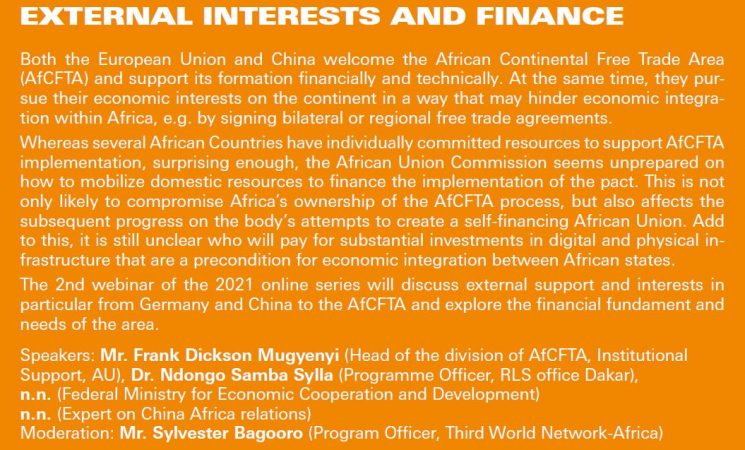Thursday | 6.5.2021 | 10:00–12:00 CET
AFCFTA CONTEXT: EXTERNAL INTERESTS AND FINANCE
Both the European Union and China welcome the African Continental Free Trade Area (AfCFTA) and support its formation financially and technically. At the same time, they pursue their economic interests on the continent in a way that may hinder economic integration within Africa, e.g. by signing bilateral or regional free trade agreements. Whereas several African Countries have individually committed resources to support AfCFTA implementation, surprising enough, the African Union Commission seems unprepared on how to mobilize domestic resources to finance the implementation of the pact. This is not only likely to compromise Africa’s ownership of the AfCFTA process, but also affects the subsequent progress on the body’s attempts to create a self-financing African Union. Add to this, it is still unclear who will pay for substantial investments in digital and physical infrastructure that are a precondition for economic integration between African states.
The 2nd webinar of the 2021 online series will discuss external support and interests in particular from Germany and China to the AfCFTA and explore the financial fundament and needs of the area.
Speakers: Mr. Frank Dickson Mugyenyi (Head of the division of AfCFTA, Institutional Support, AU), Dr. Ndongo Samba Sylla (Programme Officer, RLS office Dakar), n.n. (Federal Ministry for Economic Cooperation and Development) n.n. (Expert on China Africa relations)
Moderation: Mr. Sylvester Bagooro (Program Officer, Third World Network-Africa)
Please fill out the registration form. All further information will be sent by email.
www.rosalux.eu/webinar-afcfta-en
live stream of the event: https://www.facebook.com/events/461138054996587
Background
WEBINAR SERIES ON THE AFRICAN CONTINENTAL FREE TRADE AREA (AfCFTA)
Trading under the African Continental Free Trade Area (AfCFTA) started from 1st January 2021 onwards in the context of the evolving African and global policy landscape, including the development challenges – highlighted by the COVID-19 pandemic and the responses to it. While the AfCFTA spirit of integration is creditable, the initiative has not started without challenges. Even at its foundations, the AfCFTA still faces a number of ideological, political and economic hurdles, which are likely to derail the ambition of the Africa Vison 2063.
These range from the commitment of African Union Member States to the AfCFTA, to unresolved trade tensions between the regional economic blocs and diplomatic difficulties. It is also worth to note that there are a number of interconnected issues to the AfCFTA, which require focus. Such issues range from understanding the political economy of financing the AfCFTA; implementation of AfCFTA in the context of agendas like the Post Cotonou, Economic Partnership Agreements, Compact with Africa. Trading under the AfCFTA will also have implications on various critical topical subjects like agriculture, climate, migration and labour. Whether this is a result of variable geometry or putting national interests first, an AfCFTA that has commenced with «cherry-picking» by Member States reveals various underlying challenges.
These conversations aim to offer some insights and thoughts towards the areas yet to be negotiated under the AfCFTA that could contribute to addressing Africa’s maldevelopment as well as issues with implementing the protocols already concluded. The Rosa Luxemburg Stiftung in collaboration with SEATINI is organizing a series of webinars throughout the year to explore these interconnected issues and generate positions which will be critical in facilitating stakeholder’s engagement in AfCFTA negotiations.
A series of events organized by offices of the Rosa-Luxemburg-Stiftung in Dar es Salaam, Dakar, Tunis and Brussels and SEATINI.

